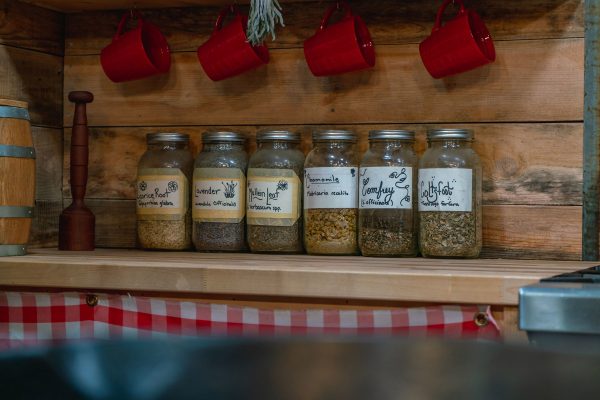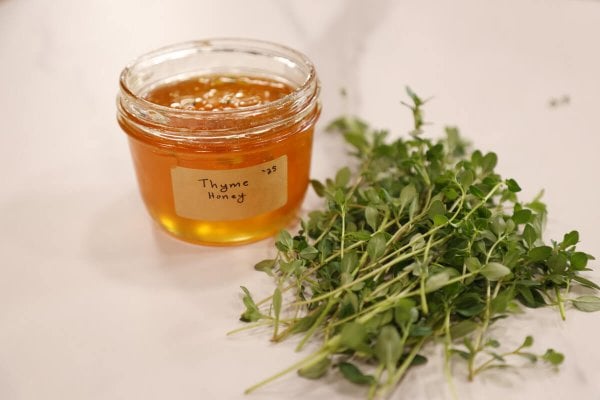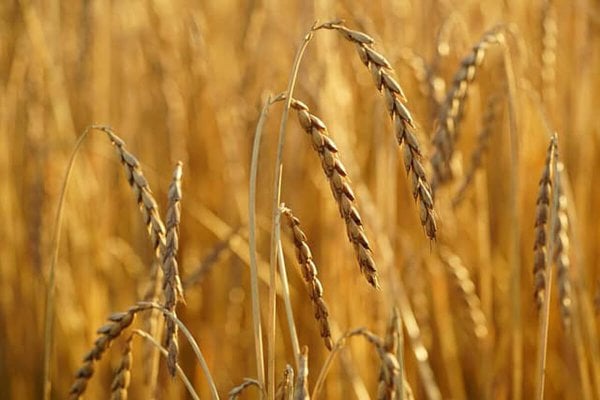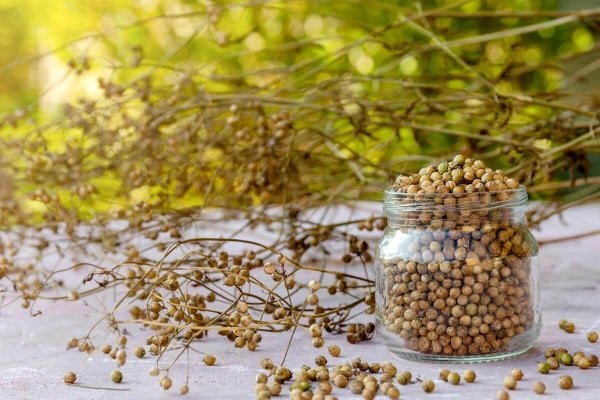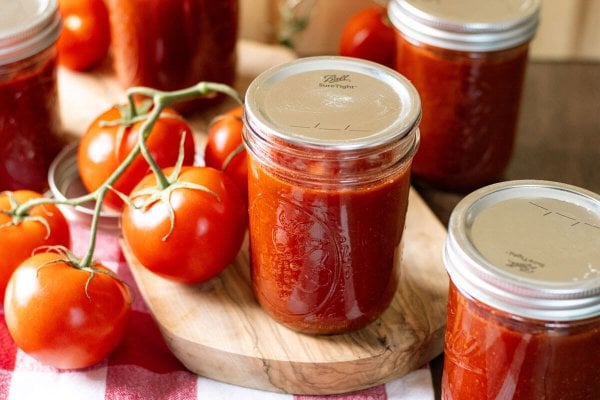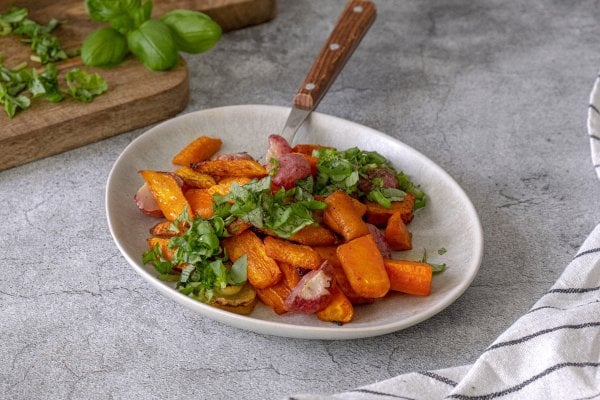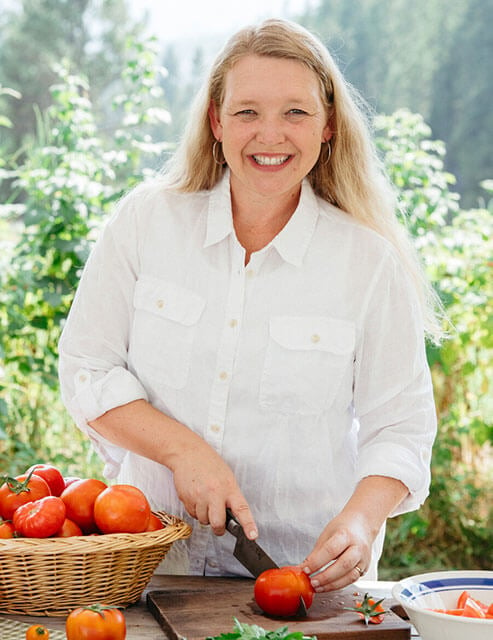
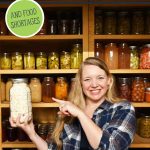
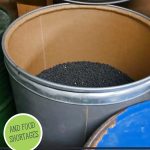
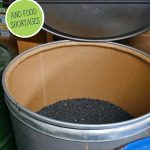

Food and gas prices continue to rise, and we don’t see an end. We should all be thinking about preparing for inflation and potential food shortages. Here are our tips to make wise decisions, not fear-based decisions.
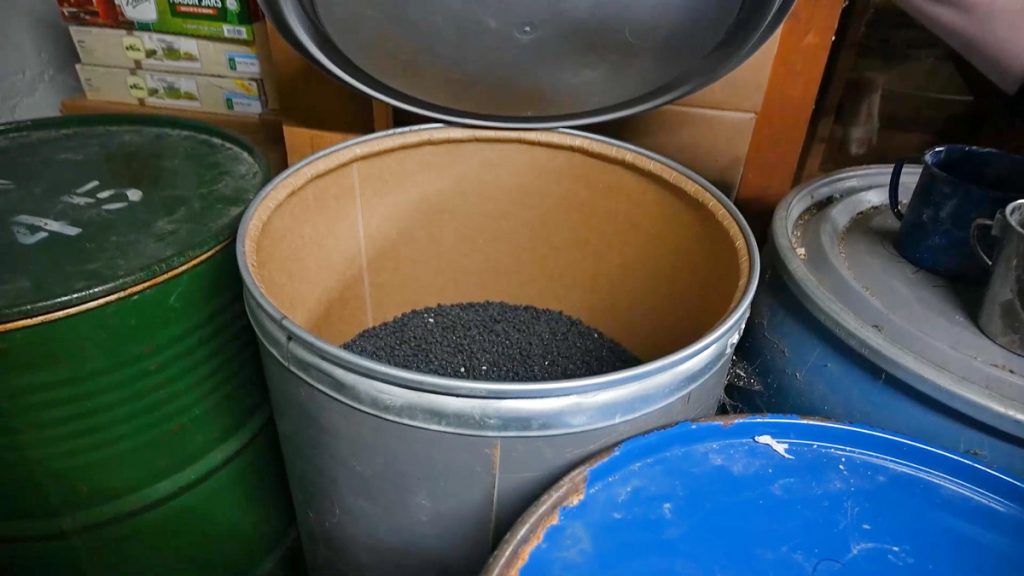
Don’t Make Decisions Based on Fear
There are a lot of rumblings about food shortages and supply chain issues that will be coming within the next year. If you’ve been to the grocery store lately, you’re already seeing inflation as prices have increased.
In some cases, grocery store prices on food have doubled since the beginning of the year (2022).
We know this is challenging and hard on a lot of people. But we want to encourage you to identify the problems and issues, but don’t start scrambling and making decisions in fear.
If you don’t have your food supply built up, we encourage you to look at this post on how to build up your long-term food storage. But continue reading because we’ll also share some tips in this post that will help.
Analyze the Situation
Take the time to thoughtfully, prayerfully, and wisely analyze your situation. Figure out where your weaknesses are, what you can do right now, and how you can move forward to strengthen your position.
However, do all this in a wise way, not a fearful way.
There’s a saying that says, “Fear is a liar.” There’s some truth to that, but there’s also something incorrect with that saying. Fear is a motivator, and it gets our attention. But it can cause us to either not act or to wake us up to take action.
We’ve been saying for two years now that this inflation is not transitory. It’s also not going away anytime soon, no matter what “they” are telling us.
Because fuel prices continue to increase, and 50% of the nation’s fuel consumption is for food production, it’s only natural that we’ll continue to see food prices rise.
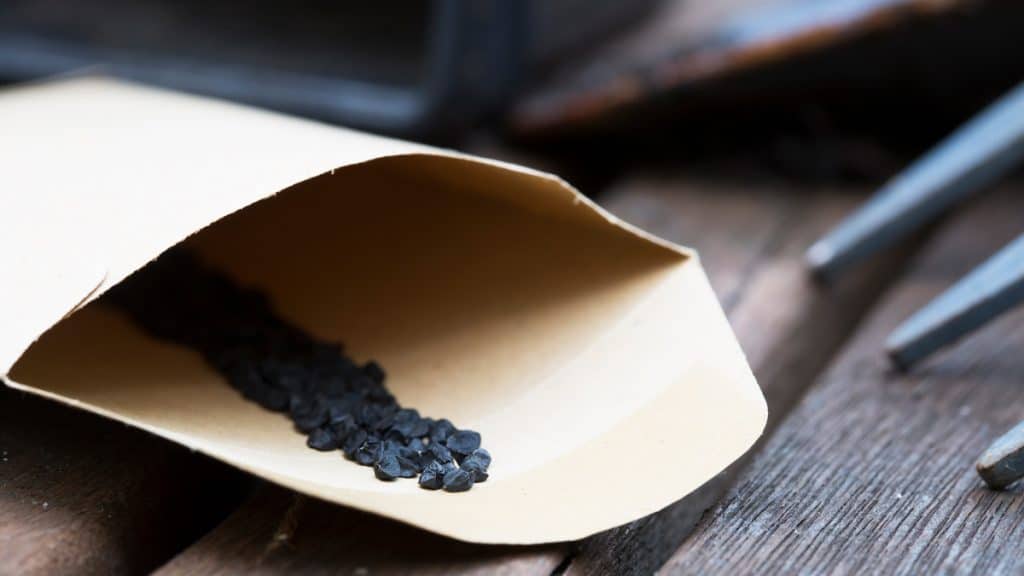
Practical Steps to Prepare for Inflation
Because we see all these issues compounding at an alarming rate, now is the perfect time to start preparing yourself. Glean the wisdom and knowledge to bring some of your livelihood back into your own hands.
We have some practical steps to encourage you to either start or continue to be prepared for the continued inflation.
Purchase Seeds Now
As more and more people turn to gardening and growing their food, sourcing seeds is going to become more difficult. Not only that, but you’ll likely be seeing an increase in those seed costs.
If you can purchase two years’ worth of seeds now, you’ll be in a great position to grow a garden and learn the skills necessary to save your seeds for future gardens.
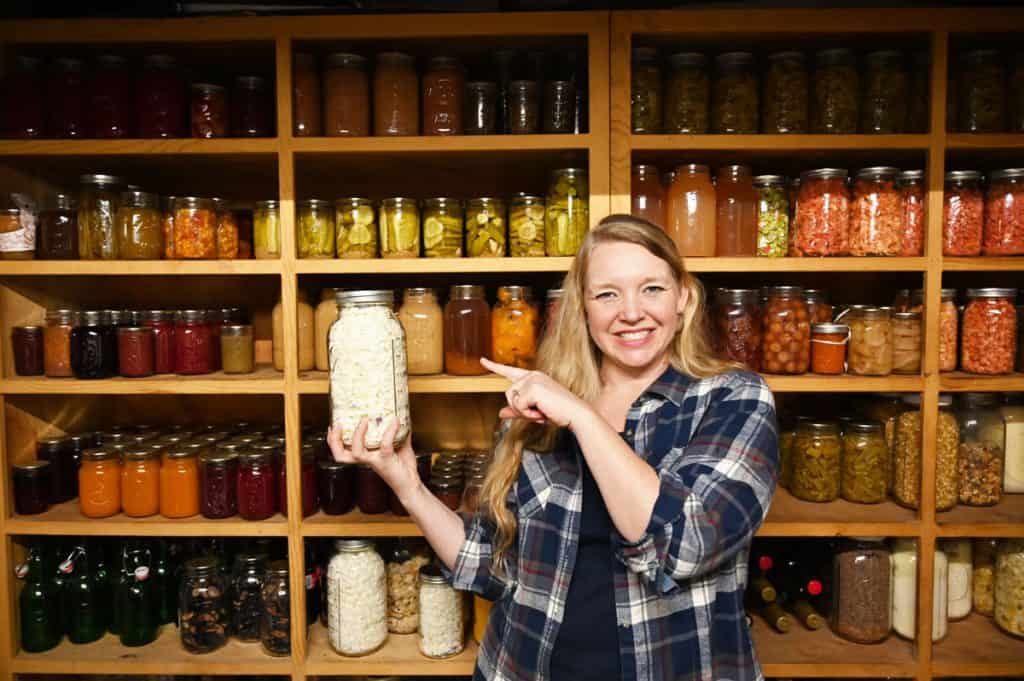
Build Up Your Bulk Food Supply
If you don’t have food in long-term storage, now is the time to start building that supply. You can learn the seven pantry staples we always have on hand here.
We recommend stocking up on bulk whole grains if you need a place to start. See how we store our grains here.
If you’re going to be storing grains, we recommend looking into buying a home grain mill such as a Nutrimill, Wondermill, a KitchenAid mill attachment, or even a hand-crank mill.
Homesteading Hack: Use that link to Nutrimill and type in the coupon code “HOMESTEADINGFAMILY” at checkout to get $20 off your purchase!
You’ll need to have a way to process these whole grains into things like flour or rolled oats (in which case you’ll need an oat flaker).
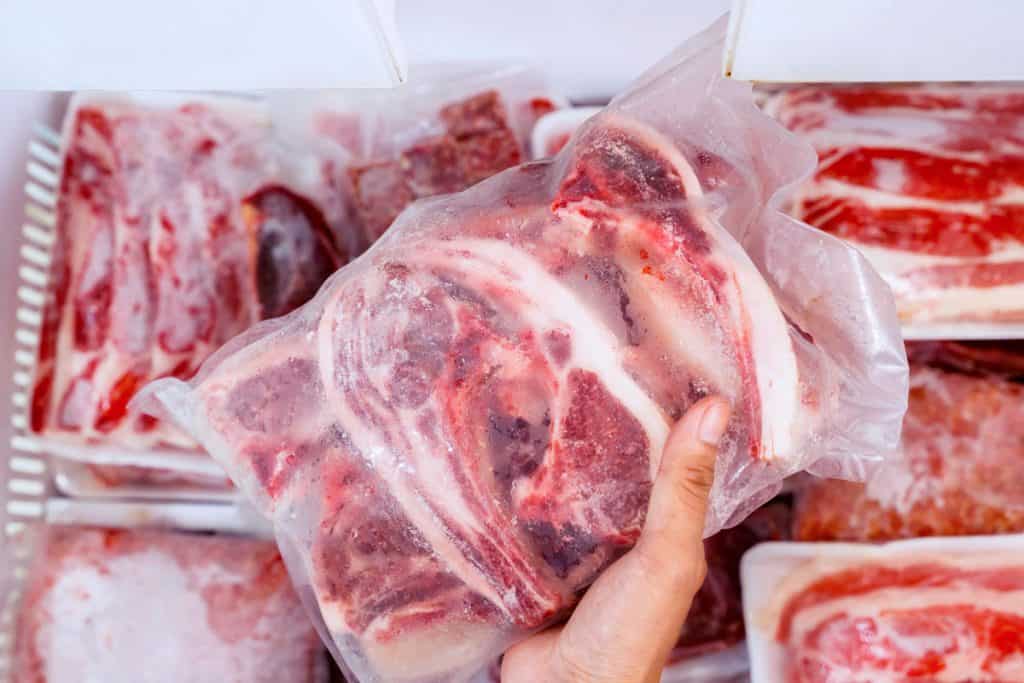
Stock Up on Meat
Right now, the grocery stores are pretty stocked up on meat, but we’re soon going to see the flipside of this. Farmers are currently selling off their stock due to higher grain and feed costs so that these prices will be reflected soon in the meat costs.
If you can stock up on meat now, it’s as good as having money in the bank. Try to buy double the meat the next time you go to the grocery store. If you can afford it, try sourcing half a cow or a whole cow.
Bulk Up on Fuel Storage
If you can bulk up on your fuel stores, this can be very valuable in getting gas at their current prices instead of waiting until later when prices are higher.
You can usually find fuel storage containers on Craigslist or Facebook Marketplace.
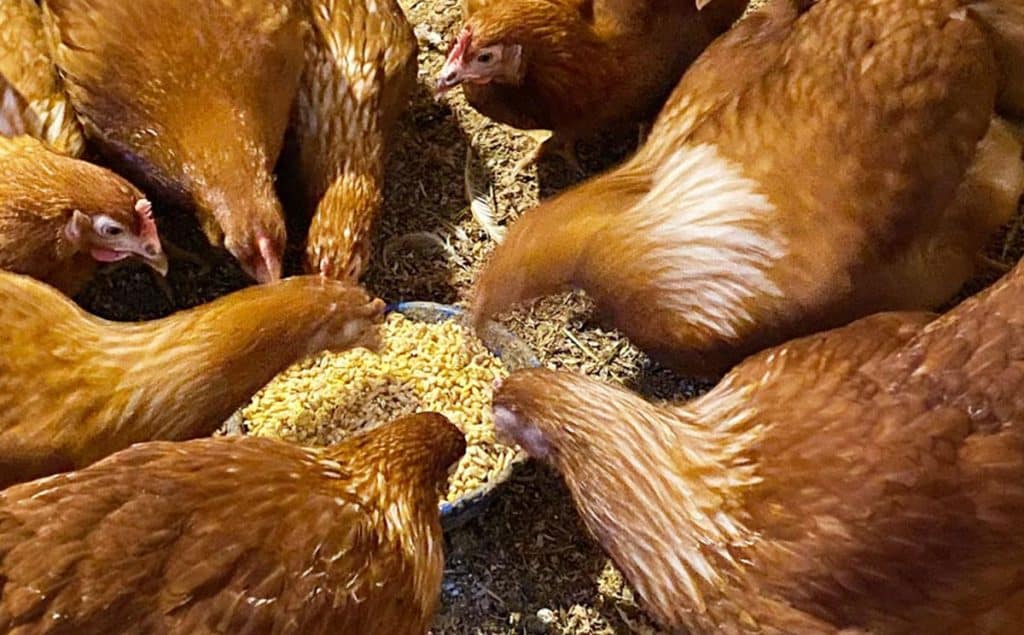
Build Up Animal Feed Supply
The same idea goes for your animal’s food supply. Grains, hay, silage, and dog food will increase over the next year. If you can afford to buy now in bulk and stock up, you will be saving money on animal feed in the long run.
Learning to ferment grains for animal feed will also help you save money while improving the health and quality of your livestock.
Get Creative in Saving Money
If food and gas prices are already difficult for you, it’s important to understand they’re not going to get better. So get creative in finding ways to save money.
We did a video on how to beat inflation at the grocery store; if you didn’t watch it, go do so!
- Cut out a few extra activities this summer.
- Camp out in the backyard instead of taking a family vacation.
- Group your errands into one trip instead of making multiple trips in the car.
- Park a car and only use one (ideally the one that uses less gas).
- Sell a car if you have an extra car that’s unneeded.
- Trim out the extras while you can and don’t get to where the bank account says you can’t.
- Consider downsizing your animals. If you have extra horses just hanging out on pasture, it might be time to sell them to someone who will be using them. I know this can sound harsh, but if money is tight, we’d rather that money put food in your mouth than the mouths of extra animals that don’t provide anything in return.
Bulk Up and Trim Down
We hope you find this information encouraging and motivational rather than something to drive fear. Our biggest encouragement is to bulk up on the things you can, and trim down on those “extras” that you can do without. Trimming down may squeeze out a little excess, allowing you to start bulking up your food stores.
If you don’t do it now, you’ll be forced to do it later.
More Posts You May Enjoy
- 10 Things I Wish I Knew Before I Started Homesteading
- How to Beat Inflation at the Grocery Store
- Building Up a Well-Stocked Pantry
- Eating Well on a Budget (With Tiffany from Don’t Waste the Crumbs)
- Prepping Your Pantry for Preserving Season
- Easy Freezer Meal Cooking Tips (Recipes & Helpful Tips)
- Tips for a Busy Preservation Day
- How to Get 3 Home Cooked Meals on the Table Every Day
- Meal Planning on the Homestead (Eating Seasonally)
- My Preserving Year-at-a-Glance
- Best Way to Use Up Garden Produce – Garden Stir Fry
- Yearly Planning on the Homestead
- 3 Things You Must Do To Increase Self-Sufficiency
Josh: Hey you guys, this is Josh.
Carolyn: And Carolyn.
Josh: With Homesteading Family. And welcome to this week's episode of the Pantry Chat Food for Thought.
Carolyn: This week we're going to be talking about preparing for ongoing inflation and possible food shortages.
Josh: Absolutely. But what we really should be talking about is preparing for filming outside on an unexpectedly rainy day.
Carolyn: We've had half an inch of rain this morning and there wasn't supposed to be any rain.
Josh: At all. And it is July. It is early July, after the fourth and supposed to be about 70 to 80 degrees right now, even in North Idaho. And we're in the low 50s with unexpected rain. And the house is full of projects, even the preservation kitchen is in use, where we often film.
Carolyn: Yes.
Josh: So we're out under the popup on the picnic tables.
Carolyn: And you can see we're both all bundled up and-
Josh: Yeah, it's chilly.
Carolyn: You're hearing the rain hit the pop up tent above us and everything.
Josh: So no studio today. You're getting live what we're dealing with. And that's just the way it goes, isn't it, on the Homestead. And you never know this year, it's wet, rainy. The garden, the vegetable garden, doesn't like it.
Carolyn: No, it's a little chilly this year for most happy days.
Josh: It's cold and wet. Yet our pasture, which has been a struggle for us, is getting some pasture developed here at Riverbend is loving it, doing great. And we're finally able to get some animals out on pasture more. We've been having to do a lot of hay feeding the last couple years to nurture the pasture. And now we're getting some rotational activity going on and sheep and cows and chickens all out there. So I'm really loving that.
Carolyn: Yeah, it's exciting. You know there's always an upside, right?
Josh: There is, yeah..
Carolyn: And that's going to come in a little bit to the discussion today too, about talking about inflation and food shortages and things. There are upsides, even when it looks a little gloomy, a little gray and dreary and rainy out.
Josh: There's always a bright side.
Carolyn: There's always a bright side.
Josh: And as you guys know, while there's always problems we're dealing with like water running down the bench. Seriously, it's wet out here. We want to identify the problems, we're always focusing on the solution. There are always positive, good steps to be taking even in challenging and even crisis times, which I don't think we're a crisis, but we're moving more and more into some challenging times. So anyways, we'll get into that in a few. Quick, what's up with you? What's going on?
Carolyn: Oh, well, not as much as would normally be going on with us for this time of year, for me. Usually we would be well into berry season and harvesting peas and all sorts of things and we are not. We do have handfuls of strawberries getting ripe. The raspberries are looking very promising, but still a couple weeks off. So I think, I have a feeling that when this season's harvest hits, it's going to hit more fast and furious than normal because we've got this long drawn out spring. So all the spring things are going to hit the same time the summer things are going to hit.
Josh: Well, what we hear is once in a while there is a long, cold wet summer and it doesn't even warm up. And I'm hoping we're not going to hit that because that definitely, I guess I better leave this here, I'm getting a wet bum.
Carolyn: Yeah
Josh: But if it does turn warm, it actually may turn out to be a very good garden year. May come on late, so.
Carolyn: It might be.
Josh: Oh yeah and there's wind and spilled coffee, too.
Carolyn: Well, they can't all be great, right? Okay. So what about you? What have you been up to? I've been doing less of... What I have been doing is trying to keep the succession beds planted because if you can't have anything else, you can have greens, right?
Josh: Oh, yeah.
Carolyn: So we're keeping, planting more and more greens because if that's what's going to grow this year-
Josh: They're happy.
Carolyn: They are happy.
Josh: Yeah, and we love fresh salads and some good cooking, leafy greens.
Carolyn: Kale's good now.
Josh: You didn't mention what you've really been up to.
Carolyn: What I've really been up to?
Josh: Right.
Carolyn: Our trip.
Josh: Yes.
Carolyn: Oh, yeah.
Josh: We took a 20th anniversary, you guys, trip. Vacation.
Carolyn: I went fishing. Deep sea fishing.
Josh: She went fishing. Actually, you know what? And then she complained a lot. So I dropped her off on a deserted island and left her.
Carolyn: And left me. All by myself.
Josh: What'd you think about that?
Carolyn: It was actually really cool.
Josh: She actually wasn't complaining.
Carolyn: I wasn't complaining. And I had asked to be dropped off on the island. I do get seasick so I kind of want my exit if it's not going well. And I was actually still feeling pretty good, but I started to get a little like, "oh, it's getting warm, I'm ready to get off and doze somewhere." And so they dropped me off on an island and drove away in the boat. What do you call that? Boated away?
Josh: We boated away. We didn't sail away.
Carolyn: But, yeah, that was an interesting experience and pretty cool actually. They, they found me this, like-
Josh: I was more nervous than she was. I came back in an hour. Went and fished for a little bit, came back in an hour and she's like, "what are you doing here? I was just falling asleep."
Carolyn: I was finally comfortable and you're back already, but who's nervous?
Josh: Anyways. That was a fun fun 20th anniversary celebration.
Carolyn: Yeah, it was. Very much. Okay. What have you been up to?
Josh: Well, besides that trip, I'm all over the country filming for the School of Traditional Skills. You guys know, producing classes. I was with Joel Salatin and then Justin Rhodes. We should link to that video. He and I actually did a video together on his place. So maybe we can link to that down below and you guys can check that out if you want.
And really around here, really working on pasture. We're getting back to some animal rotation. And getting some animals out after taking a couple years to really try and get some pasture up and running and improved. So I'm just really excited about that. Working with the guys out there, and working on our systems, and we've got sheep out preceding chickens, our meat, chickens. So that's been the focus on the homestead and it's been really, really good.
Hi, you gonna come jump in the film right here? Come visit. We're filming live right now. Yeah. Mark, you want to come say hi?
Carolyn: You don't have to.
Josh: No obligation.
Carolyn: You don't have to, we're putting dad on the spot.
Josh: But you know what? This is also part of a multi-generational family based homestead. And this is Carolyn's dad, Jim. Say hi.
Jim: Hi everybody.
Josh: And it's great to have them here on the farm with us.
Jim: Yeah. Oh, we love it up here. Even when it's raining
Carolyn: In July again.
Jim: Bye.
Carolyn: Okay, bye. Good. Well, let's see. Oh, we have one other thing that we wanted to talk about.
Josh: Yeah. This is so you're talking about God's Good Table here with Maureen Diaz.
Carolyn: Speaking of you getting to film with different really amazing people. There is an event coming up on Polyface Farm.
Josh: Yeah, which is Joel Salatin's farm if you didn't know.
Carolyn: Joel Salatin's farm. With an amazing woman. Her name is Maureen Diaz. She has worked with Weston A. Price Foundation, Sally Fallon Morell for quite a while.
Josh: Many, many, many years.
Carolyn: And she's actually starting her own platform. It's really exciting. It's called God's Good Table. And they are doing a nose to tail conference.
Josh: Event conference at Polyface. Yeah.
Carolyn: So this is really exciting because they're going to have a lot of speakers come. Let's see, I found the list here, Sally Fallon Morell's going to be there. Joel salatin's going to be speaking. Chef James Barry, if you have not seen what he makes, it's called Pluck. And it's a great way of getting extra nutrition into your food without the flavor of liver.
Josh: And using all of the animal, right. This is about using the organ meats in a way that is very useful and very flavorful. And doesn't gross people out, because some people have a hard time eating the liver and the kidney and some of this stuff.
Carolyn: And all of that stuff. Yeah. Mike, the Fit Farmer, Dickson, Pork Rhyne, Maureen Diaz and other people will be there speaking. So that's really exciting. We wish we could be there. I don't think we're going to make it to that this year.
Josh: We definitely had been invited and the timing isn't working real well with all the production we're doing. We're actually, Maureen is going to be filming a class as well for the School of Traditional skills.
Carolyn: Yes. An hour go.
Josh: So we're putting our efforts into that. But we wanted to let you guys know about this. If you're up for traveling, there's a lot of challenges this year and people may not do so much, but this is a really, really cool event to see a lot of neat people, really be inspired and even a chance to see Polyface because they're going to do a tour of Polyface.
Carolyn: Okay. Some quick details. Where is Polyface for people who don't know?
Josh: So this is in Virginia.
Carolyn: Virginia. Yeah.
Josh: So it might be a trek for some of you, but-
Carolyn: It might be real close for some of you guys.
Josh: But it's very, very inspirational and educational. You, you can't spend time with any of these people, particularly Joel and Sally, and not learn a lot and be really, really inspired. And we can all always use that.
Carolyn: And it is on August 12th and 13th of this year, which is '22. Somebody just asked me, please say dates when you're doing a video. Because some of us come and watch it long time after the fact.
Josh: Oh yeah, okay.
Carolyn: So August 12th and 13th of '22, there at Polyface. We'll put the link in the description for you guys, if you are interested. Hey, but another real treat on this is that Joel Salatin will actually be doing a Sunday morning service.
Josh: Man. I would love to go to that.
Carolyn: He'll be preaching at a Sunday morning service. So that would be a real treat to get to see that one.
Josh: Sure would. If you can go check that out. We're sponsoring it and we're definitely pitching in to help make it happen even though we can't be there. And would love any of you guys that want to go, to go check it out.
Carolyn: Absolutely.
Josh: Find out more in the link below.
Carolyn: Okay. We have a couple questions of the day today. The first one is on the homemade dream cheese video. You guys, if you have not seen this video, this is one you're going to want to watch. We'll put the link in the description too.
Eva Steinhauser says I made this and it's just incredible. Can anyone tell me how to wash my cotton straining towel after I've used it? I know Tide is probably not the best idea.
Exactly. So if you're using a towel for, or even cheesecloth or butter muslin for any sort of straining, especially when it comes to dairy, you really don't want to use laundry detergent on anything that's going to go into your food. It's really not formulated for eating. And even the good quality stuff is not going to be awesome for that.
So what you do want to do though, wash it out in the sink really really well. You can give it a little bit of a wash with a little bit of dish soap, rinse it out and then boil it for about 12 minutes in water. If for any reason you feel like there's a smell associated with it, just put a little bit of baking soda into that water while you boil it. And then str- what do you call that? String? Str-
Josh: Strain?
Carolyn: Strain? No.
Josh: Wring out?
Carolyn: Wring it out, there we go. Wring it out and hang it up to air dry completely. And that's the way you want to do that. And then it'll be all ready to go again when you're ready to use it the next time. There you have it.
Josh: Cool. All right. It's raining hard. I hope you guys are hearing okay.
Carolyn: I know we're talking loud in case you can't tell, we should have mics on, but we don't. Oh well.
Josh: Let's see, you had one more. Are we tackling this one or your first five steps to starting a homesteading journey. Lyna Howells asks, do you think 50 is too old to start a small homestead with some stock?
This is a great question and no, I don't think that's too old. I think it depends on you and your situation, your physical health. And so if you're getting ready to plan that journey, make sure you're fit. Make sure you're moving. Maybe start an exercise routine if you're on small land or whatever, but absolutely not. And you've got the right idea with some small homestead and I would include in there, start with small stock.
So if you've not done any animals, start with egg laying chickens. Very, very easy to get into and get started, a great way to just get familiar with the animals, caring for them, the routine, everything else. If you're like, just have never done anything, it's a great place.
Next logical step is meat chickens and raising meat chickens. And the reason being is one, they're small. Again, you're advancing your skills a little bit and caring for an animal. But it's also short term commitment as far as meat chickens. And you can get a lot of meat. 50 chickens at five pounds, that's 250 pounds of meat, with about an eight week time commitment out of the year. That's where that's a really great place to get used to working with that and then processing those animals.
And that doesn't take a lot of strength that doesn't take a lot of time. So if you're a bit older, that is a great, great place to start. Besides some gardens, raise bit gardens or whatever works for you. What do you think?
Carolyn: Yeah, I totally agree. In fact, we hear from people all the time where the kids have finally left home and you know, kids weren't raised in a homesteading lifestyle. And so the adults then feel like they have a freedom to move on to their homesteading lifestyle. So we're hearing from people all the time in their fifties and sixties, moving.
Josh is having issues still, don't worry.
Josh: I'm going to float away here in a second.
Carolyn: That are just starting their homesteads and they're excited. And you know, I think the thing to remember is a couple things. One, like Josh said, you can start small. It doesn't take a lot to be able to actually produce quite a bit of food and resiliency in your own system. So don't feel like you have to jump into 40 acres and all the animals or anything.
The other thing is to remember always, always is that the more, the better you get your infrastructure dialed in, the easier the work is going to be on your body. If you've got hose bibs in all the right location, you're not dragging hoses around all day long from one spot to the next. That's a really small example of it, but it's really true. Just if you can prioritize the infrastructure in the early years, then it's going to pay off long run.
Josh: Yep. Absolutely. So go for it. Get started. Just take it a step at a time. And I know there's, and we're going to be talking about this here, we're feeling a lot of pressure. There's a lot of things in the world around us that are motivating a lot of people to take action and that's the upside. That's great. We love seeing people step into this life and getting ready to take action. But even with all of that, you want success. You're always going to have a few failures, but you want to make sure to ensure your success. So you want to step appropriately for your ability, your age, your resources and not overdo it because you're scared or nervous or worried. But take appropriate steps and help build success. And that will actually accelerate faster.
Carolyn: And I think that's a great transition into our topic today about prepping now for inflation and possible food shortages. We're starting to hear lots of rumblings out there in the world, in the news and articles that there's going to be problems with food supply next year, probably starting this fall.
And obviously we're all seeing the inflation. If you've been to the grocery store, you've been to the gas pump, you've been anywhere, you're seeing prices are going up right now and have gone up. In some cases, grocery store food has doubled since the beginning of the year.
And so, that's hard on a lot of people that's really challenging, but in everything we do want to remind you guys, we identify the issues. We look at the problems, but we don't want to start scrambling and taking action in fear, right? We want to make sure that you are taking the time to prayerfully, thoughtfully, wisely, look at your situation. Analyze the situation and figure out where your weaknesses are, what you can do right now, what you can do to strengthen your position and do that in a wise way and not a fear based way.
Josh: Right? There's a saying, right. Fear is a liar. And I think that's partially wrong, partially true. Fear is a motivator and it gets our attention. It's emotion that we identify a problem and it wakes us up. And so that's where it has value. But it's in a liar and that it causes us to freak out. It causes us to either not act, or to act inappropriately. And so while we need to- Sorry, the water just keeps running over here.
You know, sometimes we need to be woke up, but then we need to look for solutions and move forward. And that's how we successfully address the problem. And so what do you do when you know, inflation is real and we don't talk a lot specifics. Economics, politics, plenty of other people are doing that. But I've been saying for a year and a half to two years, look, this inflation is not transitory like they've been telling us. It's not going away. At least not anytime in the next several years, I don't believe. And we continue to see that be a truth. We're seeing the gas prices go up substantially. Again, the news is telling us that's going to continue. And our food supply in the United States, last I read, it's been a year or two since I checked this, over 50% of our consumption is for producing food. Right there, regardless of other inflationary effects, that increases food costs.
Carolyn: So 50% of our fuel is going towards agriculture?
Josh: Fuel usage in the United States goes toward agriculture, toward our food production. What we're seeing now cannot not increase food prices, besides some of the other inflationary actions that we're seeing, but it has the delayed response. So knowing that, knowing that we're already seeing it go up, it's going to go up more.
The next layer you have is particularly the cereal grains issues that we have for a variety of reasons, reasons from the war in Ukraine and environmental issues, supply chain issues, all kinds of different things. So we believe this is all compounding right now and it is going to get more challenging. Now is the time to either start taking steps or if you have been, increase the strategy and maybe the strength of the steps that you're taking.
Carolyn: And we're going to get into some practical steps that you guys can take here in just a minute. But before we dive into that, Josh and I were having a conversation before we jumped on here to the video. And I think it was really enlightening in that we can see these things as a big problem. We can see them as like, "oh my gosh, everything's falling apart. This is a huge challenge." Or we can choose to see these things as an accelerator on our own journey. You're probably, you're watching us, you're probably already thinking about these things. You're probably already putting up food and thinking about ways to be resilient. This is going to accelerate that process.
We're going to have to do that because we have to do it moving forward. And we're going to have to make changes, not only in food storage, but also in lifestyle in order to meet these challenges gracefully, but they might be really good changes. They might be the changes that we kind of need to be taking anyways. So I want to help everybody see it from the other side that, yes, it's a challenge and it's kind of a personal challenge. Like I oftentimes meet these things like, "okay, I'm going to figure out how to feed this family well, even though food prices are going way up." So it is a challenge and yet it might be a really, really good one that has a lot of benefits on the other side. So let's hold onto that because it is going to be challenging, right?
Josh: Yeah, it is. So there are some key steps that we feel in this environment, and we've talked about them in different ways over the years, but there are some really key steps that you can be taking right now to start to hedge and to buffer yourself from some of these, basically price increases and scarcity that we're looking at over the next probably couple years.
Carolyn: One of them has to do with food storage, of course. Starting to bulk up your food supply even more than it has been, especially when it comes to things like grains and dry foods.
Josh: Whole grains, bulk whole grains is where you're going to be able to really save some money. If you're not already moving that direction and the way you store food and cook, now is a great time to start doing that and getting some bulk storage before the prices go up.
Carolyn: You might want to seriously consider getting that grain mill if you haven't done that yet, maybe even an oat roller, some grain mills have both of those options. It's a good time to think about that so that you can then store those whole grains and be able to turn them into flour or into rolled oats or whatever it is you want to use it in.
Josh: And hey, we have a lot of videos on the how to of this, so I think this is going to be a little more of a list of things and we'll link what we can. We'll get as many of those videos linked as we can that are relative down below, where we go into maybe more depth about how to buy bulk grains, how to store them, how to use them. Right now, this is just more some things to really be thinking about and doing. So, the bulk grains. Look, those grains, if you can get a 50 gallon barrel and either keep one for each grain, or you may not need that much, so bags in there. But just that lump, that's better than money in the bank. There's money in your savings account, the value of it's going down and down and down every single day, while that stored food, which is just one, that value is maintaining and even going up.
Carolyn: Yeah, absolutely. So, definitely the grains. Things like beans are a great thing to have on hand right now. Also, you want to look at your meat. There's some predictions coming out that we are going to be facing really, really low meat supplies due to some of the challenges of the growing year, this last year. And that right now meat is clinical, it's on the market. The market's a little bit flooded at the moment, but we're about to see the flip side of that, which is that everybody's selling off or has been selling off. And so they don't have any more animals coming into the process.
Josh: And grain scarcity and grain prices along with fuel affects your meat prices. And so it all starts to compound into there. So we may see that go up a lot. So even if you're buying store bought meat, realize it's really affected. And if that's the option you have, you're not raising animals, you don't have a source. And you're like, "well, all I've got store bought meat." Bulk up, get a freezer, bulk up on the things you use, try to buy a month, three months, six months a year, if you can. Work with within your means, but bulk up. And if that's the only way you can do it, then start there. It's going to help you out. Now, if you can go to local farmer and buy a half of beef or buy a pork or something like that, then that's even a better step. But be finding that way to bulk up and get your meat put up.
Carolyn: So let's address the kind of elephant in the room here that I know I've heard a lot of people are saying, "okay, we need to bulk up our food storage." But the reality is food prices are already going up. Life's getting harder for families. It's already getting harder to buy your everyday groceries. How are you going to take this hard situation and then turn around and like double what you're buying or buy more and bulk up?
It's already a challenge. But I got to say to you guys, this is not going to get better. If it's challenging for you now, it's going to be even more challenging later. It might be time to start taking a little bit of more drastic action. Maybe we cut out a few activities this summer. Maybe we stop driving the kids to all of the events, using the money on gas, things like that. Maybe it's worth staying home and camping in the front yard instead of going on a vacation so that you can put some extra money into the food storage while it's still at this level of cost and not when it's doubled again.
Josh: And that's a quick way to save money, to have some money for some of these other activities is lessening and consolidating movement. Fuel prices are going up. Okay, well drive less. When you've got to go out, plan it, get strategic. If you live in the country far out like we do, and I know some of you do, you already have to do this. But start doing it now, to where when you go out, go out for two, three hours or whatever it is a day, if you're farther away, get it all done. Plan your trip, make your trip as efficient as you can be. Get everything done you can in one outing.
Park a car if you need to in your family. And a lot of families have extra cars, park it. If you're really concerned, sell a car. Use that money to bulk up on your supplies. And I think this is going to be a reality for people, whether you choose to do it now or not, I think this reality is coming, just the prices of things. And we're already hearing it. We're hearing of the people that are driving a lot less. I'm sure you guys are experiencing that. That's going to come more. If you can get ahead of that a little bit, that's going to free up some cash to then take some of these other steps.
Carolyn: Well, and we're having to take a lot of those steps ourselves in that if somebody's going to town, we have the whole list of errands to do and let's get them all done at once if somebody's already driving to town, so that somebody else doesn't have to drive in. I think back, we kind of have this image of the 1950s as being kind of this golden era. People could survive on a single income, things like that. You look back though, most people had one car at most. They made it work. They lived within the means that they have now. We're so used to, you know, everybody has to have a car. The teenager has a car, both parents have a car, all of it. There's a lot that we can trim out if we have to. And if you get ahead of it, get ahead of the curve and you're trimming. It can help you stay ahead of the curve. So trim out the activities before the bank account says, no, you just can't do it. Start now.
Josh: Another thing, this is a little bigger, extra step. But if you have the ability to try to bulk up on fuel storage, especially if you are on a little bit of farm, you've got to drive further, you've got some space, you're running some other machinery, bulk up on fuel storage. If you search Craigslist, different ads, you can find pretty cheap fuel tanks. And then for 250 up to, we have a thousand gallon one that I had split into five hundreds, and we're getting ready to fill those out. Now that's going to be a big chunk to bite off. So that's not always easy to do and I get that. But if you can, that consolidates your movement. You can often buy that fuel, have it delivered, and it's a bit cheaper. So you're getting a deal. And the sooner you can do that, the better, because the fuel prices will probably still go up. So that's another strategy, that's a little bigger. You might have to do a little further along to do that, but it is one that can be very valuable in just that bulking up idea.
Carolyn: Absolutely. Another thing that would be really important to do right now is if you can get ahead on your animal feed, especially livestock feed that is going to get very, very hard to get as not only your neighborhood pets and other livestock in a homestead sort of mentality need to be fed. But as the commercial market is having a much harder time finding the food that it needs and the prices are going up, it's all going to get more expensive and a little more scarce.
Josh: Do not wait until October, November until it's like winter. You know, a lot of us tend to do that. And we're out of a season where that reliably works and you're going to be paying the highest prices if you're waiting till the end. Now is the time to be working on that over the next month or two. And trying to get that bulk storage of those feeds in.
Carolyn: I'm going to say something that's going to be really unpopular right now. And that is if you have excess pets and by pets, I mean like horses that are hanging out in your back pasture that aren't being used, it might be time to think about moving them onto a home where they're going to be used or where somebody else can get them hay supplies.
Josh: And this happened after 2008, after the great recession, this was a huge, huge problem where people were ditching horses because they couldn't afford them.
Carolyn: And they couldn't find other homes that could afford them. So it might be the time to do it right now before you're in the crunch and everybody else is in a crunch. Find a good home for them and move them onto another location.
Josh: We're running short on time, I know you have to be at an event here. And I think there's a theme and there's almost some contradiction in that you need to bulk up, but you need to thin down at the same time. So this is where it's important to get first, really thin on your expenditures and your movement. And looking now before you're forced to, how can you cut things out and trim up the budget in the movement, which creates ideally some excess right now that you can then put into some areas of bulking up.
And so that I think is a summary of the strategy points we're talking about. And so there's a lot of areas in your life you can probably look at and go, "what can I cut down now? What can we reshape, redo and squeeze out some excess now that's going to give us a little bit of that ability to bulk up?" And that is going to help because I believe if you don't do it now, you're going to have to do it later to some level. And you're going to be better positioned if you start now.
Carolyn: So one very last thought as we're getting ready to go take the time to plan some fun, enjoyable family, things that you can do together, right at home this summer. Campfires out in the backyard, playing music together, game nights, things like that. Don't just wipe out all the fun things in life. Replace it with other things that are meaningful and good time together.
Josh: One more, seeds. We didn't talk about seeds. Sorry that was one of the top ones on our list for growing your own food, certainly your gardens. I kind of just goes with assumption. Hopefully you're doing what you can to grow food. As all this happens, seeds are going to get more and more challenging. So stock up, stock up.
Hey, you guys keep it on the upside. Keep on the sunny side as they say. I think we've got a lot of challenges coming and we don't have any sun right now, but this can do some great things and we can grow together. We'll be here walking with you and there's always some good outcomes and we'll keep it rolling forward.
Carolyn: All right. We'll see you guys soon.
Josh: Goodbye.
Carolyn: Goodbye.
Sign up to receive email updates
Enter your name and email address below and I'll send you periodic updates about the podcast.











